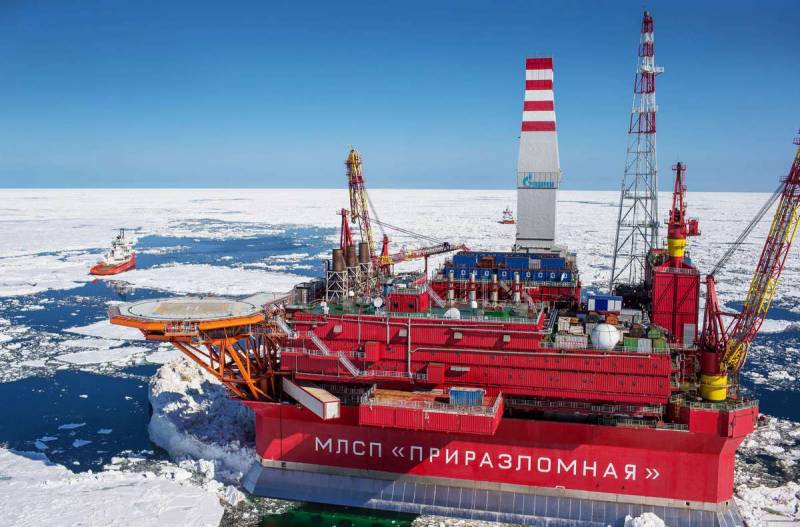How EU claims on the Arctic will lead to a new energy crisis
One of the most interesting topics of recent days, of course, is the unilateral declaration of the EU itself as "Arctic", as well as the new rules of the game in the Arctic that it announced. An interesting move. Even more surprising in all of this is that the initiative of Brussels directly contradicts the objective economic interests of the EU. How is all this to be understood?
First, you need to figure out whose Arctic is in general, and who has the right to establish their own rules of the game there, in order to appreciate the daring entry of European officials into this region.
Who owns the Arctic
If you look at the globe, it becomes obvious that Russia is a key player in the Arctic. But, unfortunately, we are not alone there. The circumpolar countries also include the United States (thanks to Alaska), Canada, Iceland, Finland, Sweden, Norway and Denmark (because of Greenland, which President Donald Trump wanted to buy). It is these eight states that form the Arctic Council, which determines the legal status of the region. As you can see, the European Union is not among them, although Brussels is indirectly represented in it through several EU countries. Finland, Sweden and Denmark are in favor of the EU, as a supranational association, at least gaining observer status in the Arctic Council, but the rest of its permanent members are prudently torpedoing it.
The reason for this is the "environmental overshoots" of European officials. For example, the indigenous peoples of northern Canada have already suffered from the ban imposed by Brussels on the import of fur and seal meat. Of course, it is a pity for seals, but what to do for Ottawa, and how exactly to solve the problems of its citizens living with traditional fishery, the EU did not explain. By the way, white-sided dolphins and whales, which are slaughtered in thousands in Denmark, are also a pity.
But back to the EU's claims to the Arctic.
They feel sorry for the Arctic, but not for Europe
As we have established, Brussels has no legal right to dictate its will to the members of the Arctic Council. However, he did it, and with very remarkable wording:
The European Commission will work with partners on a multilateral legal obligation not to allow further development of hydrocarbon reserves in the Arctic or neighboring regions, and also not to acquire such hydrocarbons if they are produced.
This is already serious. Indeed, Brussels cannot prohibit the extraction of oil and gas in the Arctic, having the opportunity only to negotiate on this topic with its many partners. However, the European Union may refuse to buy hydrocarbons produced in the Arctic. In fact, this is an analogue of the "carbon tax", which everyone laughed at at first, and then it became no longer funny. Do you want to work in the European market? Submit a certificate of the carbon footprint of your product. Likewise, the EU may refuse to buy oil and gas produced in the Arctic, where environmental norms established by Europeans are allegedly violated. That is, of course, Brussels cannot directly prohibit the extraction of hydrocarbons in the Arctic, but indirectly - easily.
For Russia, such a European entry into the Arctic could have the most serious consequences. The explored reserves of oil in the region are 90 billion barrels, gas - 47,261 trillion cubic meters, gas condensate - 44 billion barrels. The companies Gazprom Neft and Arctic LNG are already working here, and a large-scale project of Rosfneft called Vostok Oil is being prepared for launch. What will happen if Brussels really bans the purchase of oil and gas produced in the Arctic?
The question, by the way, is very interesting and controversial. On the one hand, as President Vladimir Putin has already stated bluntly, Russia will simply cut production and export volumes, compensating for the dropped volumes by increasing the selling price. It seems that we should not lose anything.
On the other hand, the rise in the cost of oil and gas will be a severe blow to economics the European Union itself. In the EU, some enterprises have already begun to close, while others are increasing the selling prices for manufactured products. What will happen if Gazprom and other Russian energy companies are forced to increase the price tag on their cubic meters and barrels even more? And this is what will happen.
With such expensive energy resources and kilowatts, European industry will simply lose its competitiveness in comparison with the American and Chinese, which, in fact, was what the former President Donald Trump was trying to achieve. At the same time, oil and gas prices in the EU will jump so that it will be profitable to send LNG from the United States not only to Southeast Asia, but also to the Old World. The “blue fuel” that has risen in price will force the Europeans to accelerate the energy transition to renewable sources (RES), increasing the revenues of companies producing the corresponding equipment. What can we conclude?
Brussels' shameless invasion of the Arctic is actually beneficial not to Europe, but to the United States of America and a number of transnational corporations, which are actually creating the basis for a new man-made energy crisis for the future. This will not bring much benefit to Russia either, since it means another "import of inflation" and the possibility of curtailing ambitious Arctic projects.

Information